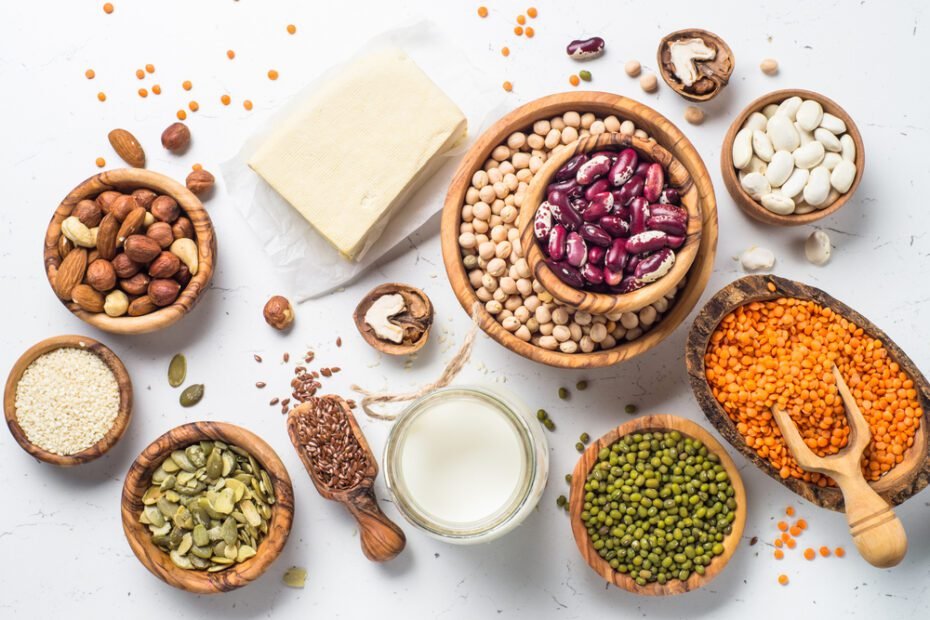Protein is an essential macronutrient vital for various bodily functions. While it’s commonly associated with animal products, there’s a wide array of plant-based sources of protein suitable for vegetarians and vegans. In this comprehensive guide, we’ll explore 15 of the best plant-based protein sources to help you meet your protein needs while following a vegetarian or vegan diet.
1. Legumes:
Legumes, such as beans, lentils, and peas, are protein-packed and versatile. They provide not only protein but also fiber and various vitamins and minerals.
Protein Content (per ½ cup cooked):
- Black beans: 7-8 grams
- Chickpeas: 7-8 grams
- Lentils: 9-10 grams
- Peas: 4-5 grams
2. Tofu:
Tofu, also known as bean curd, is a soy-based protein that takes on the flavors of the ingredients it’s cooked with. It’s an excellent source of plant-based protein.
Protein Content (per 3-ounce serving):
- Tofu: 8-15 grams
3. Tempeh:
Tempeh is a fermented soybean product with a nutty flavor and a firm texture. It’s rich in protein and a good source of probiotics.
Protein Content (per 3-ounce serving):
- Tempeh: 15-20 grams
4. Seitan:
Seitan, also known as wheat gluten or wheat meat, is a high-protein meat substitute made from gluten, the protein in wheat.
Protein Content (per 3-ounce serving):
- Seitan: 21 grams
5. Nuts:
Nuts, like almonds, peanuts, and cashews, are not only a healthy source of fats but also contain moderate amounts of protein.
Protein Content (per 1-ounce serving):
- Almonds: 6 grams
- Peanuts: 7 grams
- Cashews: 5 grams
6. Seeds:
Seeds, including chia seeds, flaxseeds, and pumpkin seeds, offer protein along with essential fatty acids and fiber.
Protein Content (per 2-tablespoon serving):
- Chia seeds: 4 grams
- Flaxseeds: 3 grams
- Pumpkin seeds: 5 grams
7. Quinoa:
Quinoa is a complete protein source, containing all nine essential amino acids. It’s also rich in fiber and other nutrients.
Protein Content (per ½ cup cooked):
- Quinoa: 4-5 grams
8. Edamame:
Edamame, young soybeans, are a tasty and nutritious snack that’s high in protein.
Protein Content (per ½ cup cooked):
- Edamame: 8-9 grams
9. Plant-Based Dairy Alternatives:
Plant-based milk, like almond, soy, and oat milk, can be fortified with protein and is a suitable replacement for dairy milk.
Protein Content (per 1 cup):
- Almond milk (fortified): 1-2 grams
- Soy milk (fortified): 7-9 grams
- Oat milk (fortified): 2-4 grams
10. Nutritional Yeast:
Nutritional yeast is a cheesy-flavored, deactivated yeast often used as a seasoning. It’s a complete protein and provides essential B vitamins.
Protein Content (per 2 tablespoons):
- Nutritional yeast: 8 grams
11. Spirulina and Chlorella:
Spirulina and chlorella are algae that offer protein, vitamins, and minerals. They are available in powder or tablet form.
Protein Content (per 1 tablespoon):
- Spirulina: 4 grams
- Chlorella: 5 grams
12. Whole Grains:
Certain whole grains like bulgur, farro, and teff provide moderate amounts of protein in addition to fiber and nutrients.
Protein Content (per ½ cup cooked):
- Bulgur: 3 grams
- Farro: 3-4 grams
- Teff: 3-4 grams
13. Hemp Seeds:
Hemp seeds are exceptionally nutritious and packed with protein, healthy fats, and essential fatty acids.
Protein Content (per 2-tablespoon serving):
- Hemp seeds: 10 grams
14. Peanut Butter:
Peanut butter is a tasty source of plant-based protein that can be enjoyed in sandwiches, smoothies, or as a dip.
Protein Content (per 2-tablespoon serving):
- Peanut butter: 8 grams
15. Green Peas:
Green peas, often overlooked, provide a surprising amount of protein and can be added to various dishes.
Protein Content (per ½ cup cooked):
- Green peas: 4 grams
These 15 plant-based protein sources can help you meet your protein needs while following a vegetarian or vegan diet. By incorporating a variety of these foods into your meals, you can enjoy a balanced and nutritious diet that supports your overall health and well-being.
